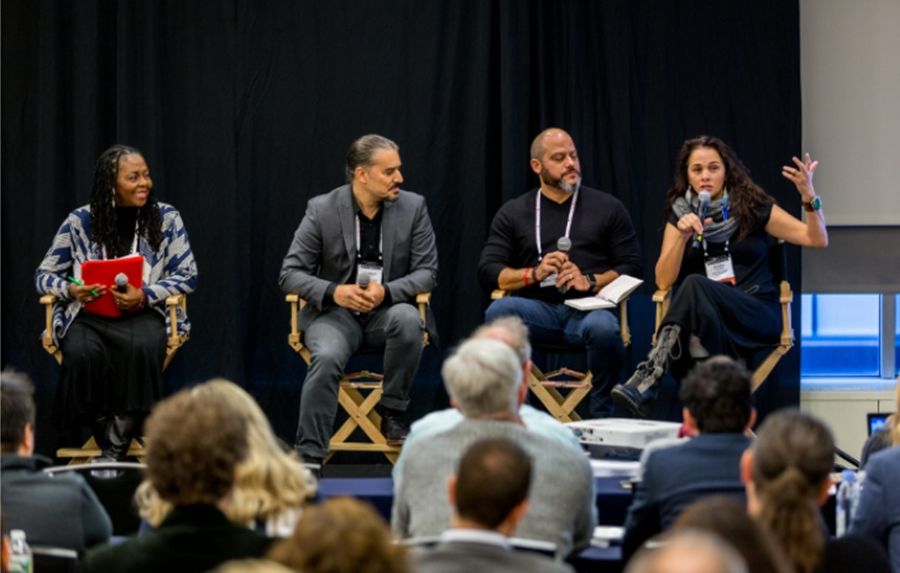NEW YORK CITY: Today Theatre Communications Group (TCG) released In Whom We Trust VI: Governing Boards Survey 2024, the organization’s sixth comprehensive study of nonprofit theatre governance, and their first in over 10 years. Since 1998, TCG (which is also the publisher of American Theatre) has periodically conducted a survey exploring theatre governing boards in depth. In Whom We Trust provides a wide range of comparative data broken down by budget size to inform the evaluation of giving levels, give/get requirements, board demographics, meeting practices, recruitment policies, and more.
“This latest edition of the Governing Boards Survey shows meaningful progress in the urgent work of diversifying not-for-profit theatre boards,” Emilya Cachapero, TCG’s co-executive director of national and global programming, said in a statement. “It was also heartening to see that in spite of several high-profile conflicts between board and staff, most theatre leaders rate the health of their relationships with trustees highly. Strengthening that critical relationship has been a decades-long priority for TCG, and we look forward to continuing that work with this report and future governance-themed programming.”
The survey was written and designed by Corinna Schulenburg, co-lead of research programs at TCG, with editing by Rachael Hip-Flores, also co-lead of research programs at TCG. It features data from 141 theatres, representing a wide range of budget sizes and regions. Key findings include:
- Increased racial diversity on boards: One of the most significant changes in governance since the 2013 Governing Boards Survey is the rising racial diversity of trustees. In the five Governing Boards Surveys from 1998-2013, trustees were between 85-89 percent white. In 2024, the growth in the number of BIPOC trustees reduced the average to 71 percent across all budget groups. Also of interest: In the past, the boards of smaller theatres were more racially diverse. In the 2024 season, boards across all budget sizes are more reflective of U.S. demographics.
- Meeting practices: 93 percent of theatres always or sometimes use Robert’s Rules to conduct their board meetings, with 45 percent declaring their parliamentary practice very effective, and 42 percent calling them somewhat effective. A small number of theatres are experimenting with variations of consensus-based decision-making.
- Discussion priorities: Four topics are prioritized at board meetings—fiduciary/budgeting, ticket sales/audience building, programmatic discussion, and fundraising/capital campaigns—with hiring/succession, legal compliance, and risk assessment the least frequently discussed.
- Trustee giving: The larger the budget size of the theatre, the greater the median trustee gift, with trustees giving a median $20,032 annual gift for budget group six theatres (those with over $10 million annual budgets).
- Give/get policies: In 2024, 43 percent of theatres reported having some kind of give/get policy (i.e., a requirement that board members contribute or raise a certain amount of money), a significant decline from the 78 percent of theatres that did in 2013.
- Time spent with trustees: Theatre staff combined spent an average of 25 hours weekly working with trustees.
- Board-staff relationships: Theatre leaders rated their relationships with trustees highly—an average of 4.48 out of 5.
- Decision-making authority: The board holds most decision-making power around hiring at executive level, annual budgeting, and strategic planning.
- Top challenges in board-staff relations: Theatre leaders named “Unrealistic expectations of staff capacity,” “Not following through on board commitments,” and “Rising demands on staff time” as the primary challenges impacting board-staff relationships.
Theatre Communications Group (TCG), the national organization for theatre, leads for a just and thriving theatre ecology. Since its founding in 1961, TCG’s constituency has grown from a handful of groundbreaking theatres to over 750 member theatres and affiliate organizations and over 3,000 individual members. Through its programs and services, TCG reaches over one million students, audience members, and theatre professionals each year.
Support American Theatre: a just and thriving theatre ecology begins with information for all. Please join us in this mission by joining TCG, which entitles you to copies of our quarterly print magazine and helps support a long legacy of quality nonprofit arts journalism.


